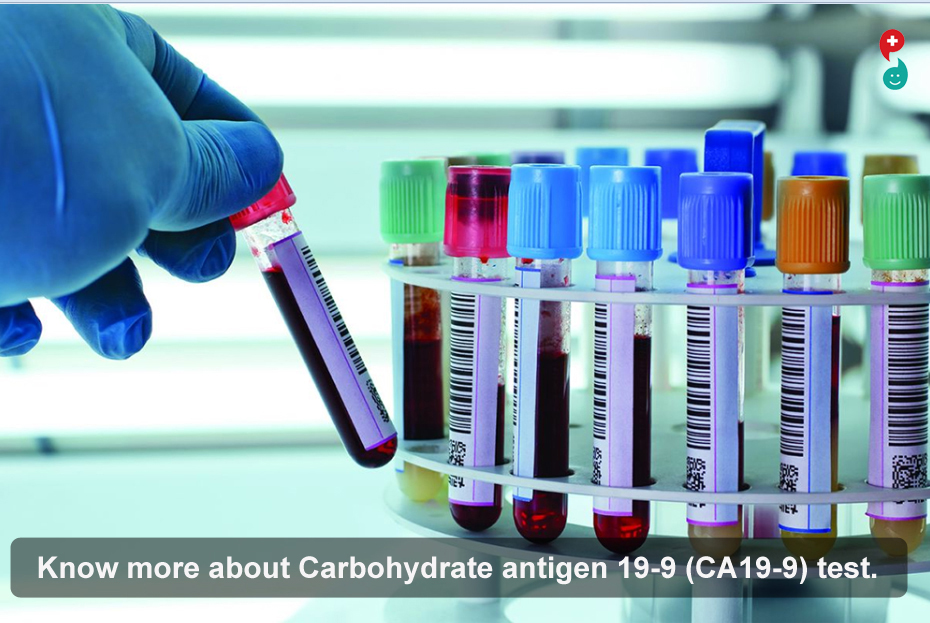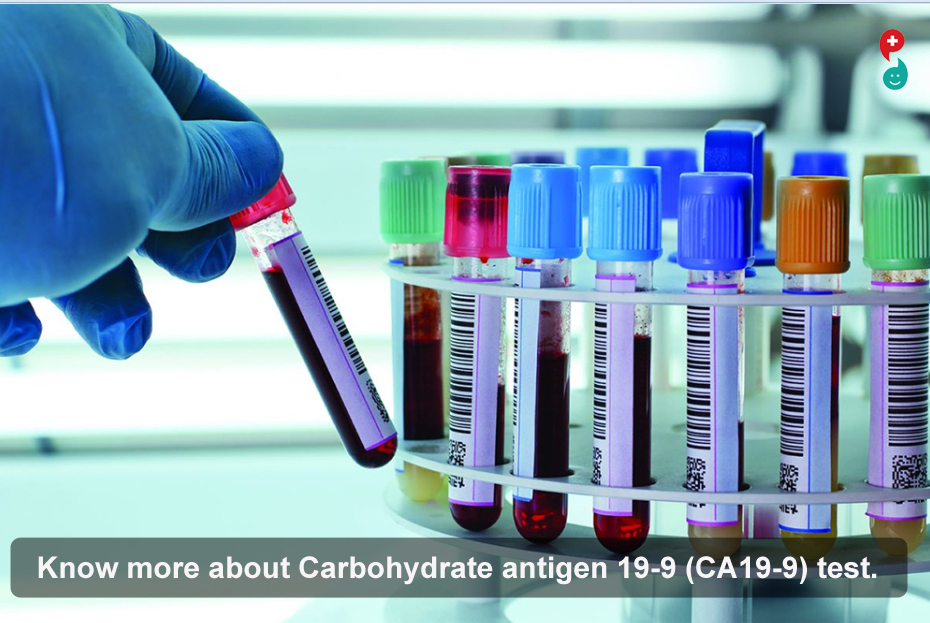Carbohydrate antigen 19-9 (CA19-9) test
CA19-9 is the common term for carbohydrate antigen sialyl Lewis a. It is a protein found on the surface of certain cancer cells. It may be found in the blood when it is shed by cancer cells.
CA19-9 is commonly used as a tumour marker for some types of cancer of the pancreas.But this test cannot be used by itself to find pancreatic or other cancers because:
CA19-9 is also found in healthy adults in small amounts in the pancreas, liver,gallbladder and lungs.
About 5% of people do not produce CA19-9,so this test cannot be used for them.
The blood levels of this antigen may also be at a higher than normal level in healthy people and in people with non-cancerous conditions such as pancreatitis or bile duct obstruction.
Why a CA19-9 test is done
A CA19-9 test is mainly used to:
check a person’s response to treatment for some types of pancreatic cancer, especially advanced pancreatic cancer
see if pancreatic cancer is still growing or has come back (recurred) after treatment
How a ca19-9 test is done
CA19-9 is usually measured by a blood test. The blood sample is sent to a lab to be tested.
What the results mean
A higher than normal level of CA19-9 can be found in healthy people and can also be found in people with non-cancerous and cancerous conditions.
Non-cancerous conditions include:
liver diseases, such as cirrhosis or hepatitis
inflammation of the gallbladder (cholecystitis) or gallstones
inflammation of the pancreas (pancreatitis)
cystic fibrosis
some disorders of the lung, kidney or gastrointestinal tract
Types of cancer include:
some types of pancreatic cancer
colorectal
stomach
liver
bile duct
lung
breast
uterine
ovarian
The highest levels of this antigen are most commonly seen in people with advanced pancreatic cancer. CA19-9 is not usually high in people with very early stages of the disease.
If CA19-9 levels have been higher than normal, a decrease in CA19-9 or a return to normal values may mean that the cancer is responding well to treatment. An increase may mean that the cancer is not responding well to treatment, is still growing or is coming back. A slight increase may not be important. The doctor compares the levels over time.
Carbohydrate antigen 19-9 (CA19-9) test
CA19-9 is the common term for carbohydrate antigen sialyl Lewis a. It is a protein found on the surface of certain cancer cells. It may be found in the blood when it is shed by cancer cells.
CA19-9 is commonly used as a tumour marker for some types of cancer of the pancreas.But this test cannot be used by itself to find pancreatic or other cancers because:
CA19-9 is also found in healthy adults in small amounts in the pancreas, liver,gallbladder and lungs.
About 5% of people do not produce CA19-9,so this test cannot be used for them.
The blood levels of this antigen may also be at a higher than normal level in healthy people and in people with non-cancerous conditions such as pancreatitis or bile duct obstruction.
Why a CA19-9 test is done
A CA19-9 test is mainly used to:
check a person’s response to treatment for some types of pancreatic cancer, especially advanced pancreatic cancer
see if pancreatic cancer is still growing or has come back (recurred) after treatment
How a ca19-9 test is done
CA19-9 is usually measured by a blood test. The blood sample is sent to a lab to be tested.
What the results mean
A higher than normal level of CA19-9 can be found in healthy people and can also be found in people with non-cancerous and cancerous conditions.
Non-cancerous conditions include:
liver diseases, such as cirrhosis or hepatitis
inflammation of the gallbladder (cholecystitis) or gallstones
inflammation of the pancreas (pancreatitis)
cystic fibrosis
some disorders of the lung, kidney or gastrointestinal tract
Types of cancer include:
some types of pancreatic cancer
colorectal
stomach
liver
bile duct
lung
breast
uterine
ovarian
The highest levels of this antigen are most commonly seen in people with advanced pancreatic cancer. CA19-9 is not usually high in people with very early stages of the disease.
If CA19-9 levels have been higher than normal, a decrease in CA19-9 or a return to normal values may mean that the cancer is responding well to treatment. An increase may mean that the cancer is not responding well to treatment, is still growing or is coming back. A slight increase may not be important. The doctor compares the levels over time.
Carbohydrate antigen 19-9 (CA19-9) test
CA19-9 is the common term for carbohydrate antigen sialyl Lewis a. It is a protein found on the surface of certain cancer cells. It may be found in the blood when it is shed by cancer cells.
CA19-9 is commonly used as a tumour marker for some types of cancer of the pancreas.But this test cannot be used by itself to find pancreatic or other cancers because:
CA19-9 is also found in healthy adults in small amounts in the pancreas, liver,gallbladder and lungs.
About 5% of people do not produce CA19-9,so this test cannot be used for them.
The blood levels of this antigen may also be at a higher than normal level in healthy people and in people with non-cancerous conditions such as pancreatitis or bile duct obstruction.
Why a CA19-9 test is done
A CA19-9 test is mainly used to:
check a person’s response to treatment for some types of pancreatic cancer, especially advanced pancreatic cancer
see if pancreatic cancer is still growing or has come back (recurred) after treatment
How a ca19-9 test is done
CA19-9 is usually measured by a blood test. The blood sample is sent to a lab to be tested.
What the results mean
A higher than normal level of CA19-9 can be found in healthy people and can also be found in people with non-cancerous and cancerous conditions.
Non-cancerous conditions include:
liver diseases, such as cirrhosis or hepatitis
inflammation of the gallbladder (cholecystitis) or gallstones
inflammation of the pancreas (pancreatitis)
cystic fibrosis
some disorders of the lung, kidney or gastrointestinal tract
Types of cancer include:
some types of pancreatic cancer
colorectal
stomach
liver
bile duct
lung
breast
uterine
ovarian
The highest levels of this antigen are most commonly seen in people with advanced pancreatic cancer. CA19-9 is not usually high in people with very early stages of the disease.
If CA19-9 levels have been higher than normal, a decrease in CA19-9 or a return to normal values may mean that the cancer is responding well to treatment. An increase may mean that the cancer is not responding well to treatment, is still growing or is coming back. A slight increase may not be important. The doctor compares the levels over time.
कार्बोहायड्रेट अँटीजन ही सेयायल लेविस ए साठी सीए 19-9 ही सामान्य संज्ञा आहे. हे काही कर्करोगाच्या पेशींच्या पृष्ठभागावर आढळून आले आहे. कर्करोगाच्या पेशींद्वारे तो रक्तामध्ये आढळतो.
सीए 19-9 हा सामान्यतः पॅनक्रियाच्या काही प्रकारच्या कर्करोगासाठी ट्यूमर मार्कर म्हणून वापरला जातो. परंतु या चाचणीचा उपयोग अग्नाशयी(पॅनक्रिया) किंवा इतर कर्करोग शोधण्यासाठी केला जाऊ शकत नाही कारण:
सीए 19-9 हे निरोगी प्रौढांमध्ये पॅनक्रिया, यकृत, पित्ताशय आणि फुफ्फुस मध्ये अल्प प्रमाणात आढळतात.
सुमारे 5% लोकांच्या शरीरामध्ये सीए 19-9 तयार होत नाही, म्हणून ही चाचणी त्यांच्यासाठी वापरली जाऊ शकत नाही.
अँटीजन चे प्रमाण रक्तामध्ये निरोगी लोकांमध्ये आणि नॉन-कैंसर रोगामध्ये , जसे अग्नाशयशोथ(पॅनक्रिया) किंवा पित्त वाहिनीच्या अडथळ्यामध्ये देखील सामान्य पातळीपेक्षा जास्त असू शकते.
सीए 19-9 चाचणी का केली जाते?
सीए 19-9 चाचणी मुख्यतः वापरली जाते:
एखाद्या प्रकारचे अग्नाशयी(पॅनक्रिया)कर्करोगासाठी, विशेषत: प्रगत अग्नाशयी(पॅनक्रिया)कर्करोगाच्या उपचार करण्यासाठी एखाद्या व्यक्तीचा प्रतिसाद तपासण्यासाठी. अग्नाशयी (पॅनक्रिया)कर्करोग अद्याप वाढत आहे किंवा उपचारानंतर परत (पुनरावृत्ती)झाली आहे का ते पाहण्यासाठी वापरली जाते.
सीए 19-9 चाचणी कशी केली जाते?
सीए 19-9 सामान्यतः रक्त तपासणीद्वारे मोजली जाते.रक्त नमुना तपासणीसाठी प्रयोगशाळेकडे पाठविला जातो.
चाचणी परिणामांचा अर्थ काय?
निरोगी लोकांमध्ये सीए 19-9 सामान्य पातळीपेक्षा जास्त आढळू शकते आणि ते कर्करोगामुळे आणि कर्करोगाच्या परिस्थितीत देखील जास्त आढळू शकतात.
गैर-कर्करोगाच्या परिस्थितींमध्ये समाविष्ट आहे:
सिरोसिस किंवा हेपेटायटीस सारख्या यकृत रोग
पित्ताशय फुफ्फुसाचा दाह किंवा जळजळ
पॅनक्रिया (सूज)
सिस्टिक फाइब्रोसिस
फुफ्फुस,मूत्रपिंड किंवा गॅस्ट्रोइंटेस्टाइनल ट्रॅक्टचे काही विकार
कर्करोगाच्या प्रकारांमध्ये खालील समाविष्ट आहे:
काही प्रकारचे अग्नाशयी कर्करोग
कोलोरेक्टल
पोट
यकृत
पित्ताशय नलिका
फुफ्फुसे
स्तन
गर्भाशयात
डिम्बग्रंथी
प्रगत अग्नाशयी कर्करोग असलेल्या लोकांमध्ये या एंटीजनचे सर्वाधिक प्रमाण सामान्यतः पाहिले जाते. सीए 19-9 सामान्यत: रोगाच्या सुरुवातीच्या अवस्थेत असलेल्या लोकांमध्ये जास्त नसते.
सीए 19-9 पातळी सामान्यांपेक्षा जास्त असल्यास याचा अर्थ असा होतो की कर्करोग उपचारांना चांगला प्रतिसाद देत नाही आहे, सीए 19-9 मध्ये कमी होणे किंवा सामान्य मूल्यांकडे परत येणे याचा अर्थ असा होतो की कर्करोग उपचारांना चांगला प्रतिसाद देत आहे. किंचित वाढ महत्वपूर्ण असू शकत नाही त्यामुळे डॉक्टर वेळेच्या पातळीशी तुलना करतात.












